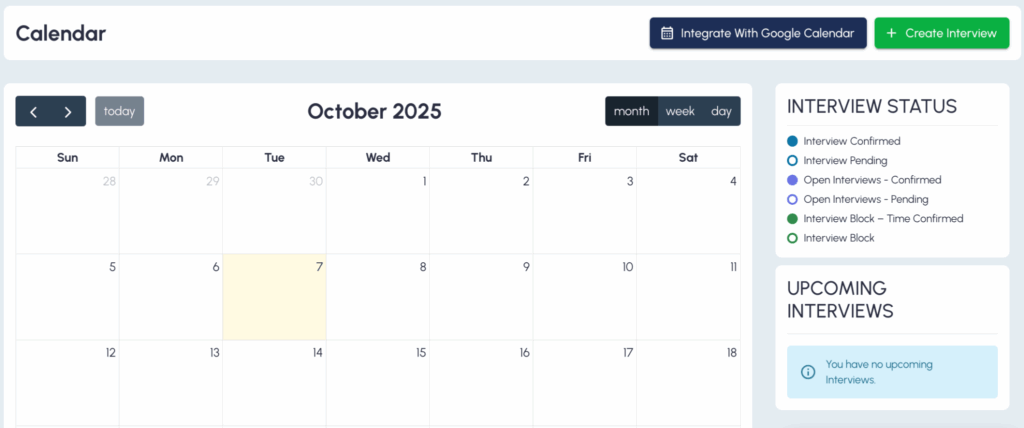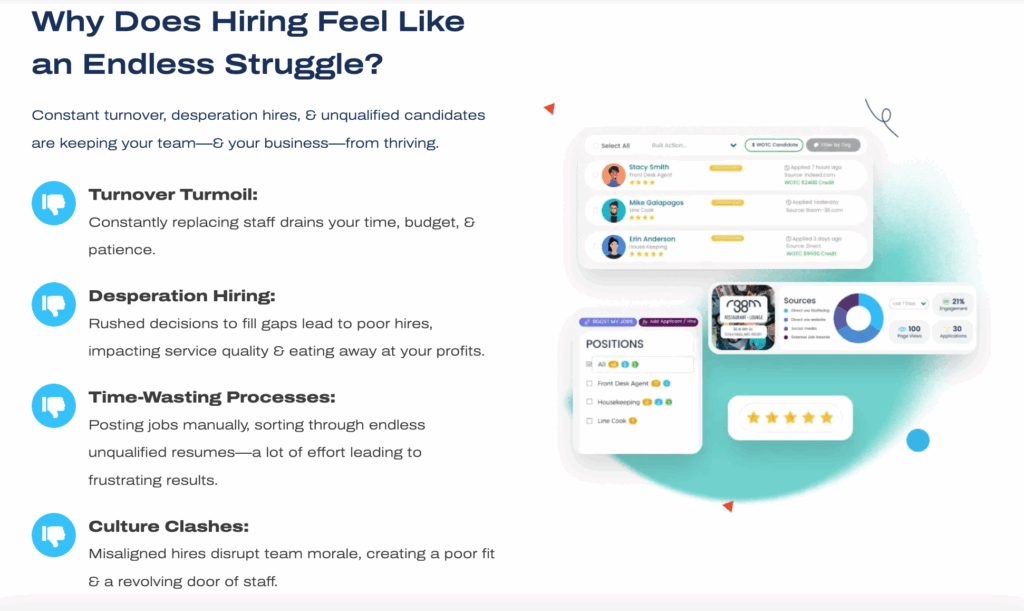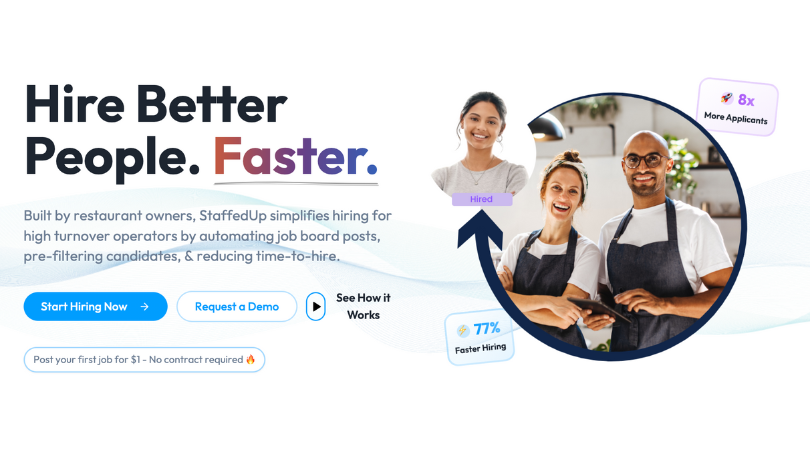Introduction
Restaurant jobs are unique. Unlike many industries, restaurants rely on teamwork, quick thinking, and customer service skills. When managers interview candidates, they’re not only looking at your résumé. They’re watching how you communicate, handle stress, and interact with people (aka soft skills).
For applicants, preparing for common restaurant interview questions can be the difference between landing the job or being passed over. For employers, asking the right questions helps identify staff who will fit the restaurant’s culture and provide excellent service.
This guide breaks down the top restaurant interview questions, explains why they’re asked, and shares sample answers to help top candidates prepare. It also includes role-specific questions for servers, cooks, managers, and hosts, along with key tips for hiring managers.

Why Restaurant Interviews Are Different
Restaurant interviews go beyond standard questions like “Tell me about yourself.” They often test soft skills such as communication, attitude, and ability to handle stress.
Unlike office jobs, most restaurant positions involve:
- High customer interaction – Smiling, being polite, and handling complaints.
- Fast-paced teamwork – Working with servers, cooks, and hosts smoothly.
- Handling pressure – Staying calm during busy shifts or unexpected issues.
Because of this, managers often look for traits over experience. Someone friendly and eager to learn may be a better hire than a candidate with years of experience but a poor attitude.
Looking for a new role in your city? StaffedUp works with thousands of local restaurants who are actively looking for new team members.
General Restaurant Interview Questions
These are the questions you’ll hear in almost every restaurant job interview, regardless of the role. These can be asked during virtual interviews as well – some restaurants are using phone screenings or virtual interviews as a first step.
1. Tell me about yourself.
- Why it’s asked: To learn about your personality and background.
- Sample answer:
“I’ve worked in customer service for two years and love meeting new people. I enjoy being in fast-paced environments and take pride in making guests feel welcome.”
2. Why do you want to work at this restaurant?
- Why it’s asked: To see if you’re genuinely interested.
- Sample answer:
“I admire how this restaurant values fresh ingredients and great service. I want to be part of a team that shares those values.”
3. What experience do you have in food service?
- Why it’s asked: To check past experience and transferable skills.
- Sample answer:
“I worked as a barista for a year, which taught me how to handle rushes, manage orders, and provide friendly service.”
4. How do you handle stress during busy times?
- Why it’s asked: To see if you can stay calm under pressure.
- Sample answer:
“I focus on staying organized and calm. I take one task at a time and support my team to keep things moving.”
5. What does good customer service mean to you?
- Why it’s asked: To check alignment with the restaurant’s service standards.
- Sample answer:
“Good service means making guests feel valued — greeting them with a smile, being attentive, and resolving issues quickly.”
Common Restaurant Interview Questions by Role
For Servers
- How would you handle a difficult guest?
- How do you stay organized while serving multiple tables?
- Can you upsell menu items without being pushy?
Example Answer (handling a difficult guest):
“I’d listen to their concerns without interrupting, apologize sincerely, and offer a solution like replacing the dish or bringing the manager if needed.”
For Cooks
- How do you keep a kitchen station clean and safe?
- How do you handle mistakes with food orders?
- Can you prepare meals under time pressure?
Example Answer (handling mistakes):
“If I make an error, I admit it right away and correct the dish as fast as possible. Communication with the expo line is key to keeping service smooth.”
For Hosts/Hostesses
- How do you handle long wait times with guests?
- How do you manage reservations and walk-ins?
- What would you do if a guest is upset about seating?
Example Answer (long wait times):
“I’d thank guests for their patience, give an accurate wait time, and offer water or menus to keep them comfortable.”
For Managers
- How do you motivate your team during tough shifts?
- How do you handle staff conflicts?
- What’s your approach to reducing turnover?
Example Answer (motivating staff):
“I motivate by staying positive, leading by example, and recognizing hard work. A quick thank-you or shift meal can boost morale.”

Situational and Behavioral Questions
Hiring managers often use behavioral interview questions to see how you’ve handled real situations in the past.
Examples:
- Tell me about a time you dealt with an unhappy customer.
- Describe a time you worked as part of a team to achieve a goal.
- How have you handled a mistake at work?
Tip for answering: Use the STAR method (Situation, Task, Action, Result).
Sample Answer (dealing with an unhappy customer):
- Situation: A guest complained their meal was cold.
- Task: I needed to resolve the issue quickly.
- Action: I apologized, took the meal back, and asked the kitchen for a rush replacement.
- Result: The guest thanked me for handling it well and left a positive review.
Keep these tips in mind when hiring seasonal team members as well.
Personality and Soft Skill Questions
Since restaurants are people-focused, interviewers want to know about your personality and teamwork skills.
- How do you stay positive during a long shift?
- What motivates you to do your best?
- How do you get along with coworkers?
Sample Answer (staying positive):
“I remind myself that guests are here to enjoy their time. A smile and good energy make the shift better for both them and my team.”
Red Flags Interviewers Look For
Hiring managers pay attention not only to answers but also to behavior.
- Speaking negatively about past employers.
- Showing little interest in teamwork.
- Avoiding eye contact or seeming distracted.
- Arriving late or unprepared for the interview.
Tips for Employers Conducting Interviews
Hiring managers should prepare just as much as applicants. Here are ways to improve interviews:
- Standardize questions so all candidates are judged fairly.
- Look for traits, not just experience (friendly, dependable, willing to learn).
- Take notes during interviews to compare later.
- Be clear about expectations (schedule, dress code, responsibilities). This is only going to help your new hire stick around.
Pro Tip: Compare successful current employees’ traits and use them as a benchmark when hiring new staff.
Comparison Table: Candidate Traits vs. Experience
| Candidate Type | Pros | Cons |
| Experienced Candidate | Quick to train, understands workflow | May bring bad habits, less adaptable |
| Less Experienced Candidate | Fresh perspective, easier to train to your system | Needs more initial training |
How to Prepare for a Restaurant Interview
- Research the restaurant (menu, style, values).
- Dress neatly and appropriately.
- Bring a copy of your résumé.
- Practice answering common restaurant interview questions.
- Prepare 2–3 questions to ask the manager (e.g., “What does success look like in this role?”).
- Review resumes before interviews.
- Plan consistent questions.
- Create a welcoming interview space.
- Use an applicant tracking system (ATS) to manage candidates.

Final Thoughts
Restaurant interviews are about more than just skills. They test attitude, teamwork, and customer service mindset. For candidates, practicing common restaurant interview questions builds confidence. For employers, asking the right questions helps find staff who fit both the role and the restaurant’s culture.
StaffedUp is bridging the gap between employers and applicants streamlining the interview process for both sides. Bonus for employers = the interview process on StaffedUp’s platform couldn’t be simpler. Check it out today to level up your hiring.
Hiring is never perfect, but with the right preparation, both sides can walk away happy. Whether you’re applying for a server job or looking to hire your next line cook, preparation makes the process smoother and more successful.



